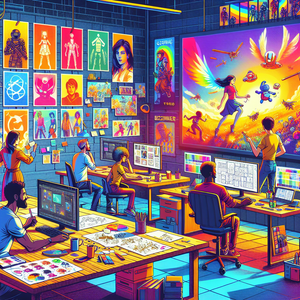
15 Entry-Level Game Development Jobs: Your Gateway to a Career in Gaming
The gaming industry is booming, presenting an incredible opportunity for those eager to dive into game development. A plethora of entry-level positions spans various specializations, from coding to design, making it an ideal time to kickstart your journey. This guide serves as a roadmap for aspiring game developers, detailing roles suited for diverse skills and interests.
Job Summaries:
Game Tester:
- Game Testers are vital to the game development process, identifying bugs and providing feedback on gameplay mechanics.
- Typically requiring a high school diploma and strong analytical skills.
- This role offers an annual salary between $30,000 and $50,000.
- It’s an excellent entry point for anyone looking to gain firsthand experience in a gaming environment.
Junior Game Designer:
- Help create engaging game mechanics, characters, and storylines.
- Collaboration with senior designers is key.
- A degree in game design is advantageous, but a strong portfolio can often make up for it.
- Salaries range from $40,000 to $60,000.
- Promising starting role for future lead designers.
Entry-Level Game Programmer:
- Entry-Level Game Programmers are responsible for writing code for game features and functionality under the mentorship of seasoned developers.
- Proficiency in languages like C++ or C# is essential.
- Although a degree in computer science is preferred, personal projects and internships can bolster your application.
- Salaries range from $50,000 to $70,000.
QA Analyst:
- Quality Assurance Analysts ensure games function properly and meet quality standards prior to release.
- Developing test plans and assessing gameplay performance are crucial tasks.
- While a degree can help, hands-on experience with testing methodologies is often more important.
- Salaries typically fall between $40,000 and $60,000.
Level Designer:
- Level Designers craft immersive environments and challenges for players.
- A solid grasp of game mechanics and design software is necessary.
- While a degree in game design is beneficial, a compelling portfolio is essential.
- Entry-level salaries range from $45,000 to $70,000.
Game Artist:
- Game Artists create the visual components of a game, including characters and environments.
- A good foundation in art principles and proficiency in graphic design software is key.
- While a degree in fine arts can be helpful, a strong portfolio is often sufficient.
- Entry-level salaries typically range from $40,000 to $65,000.
Audio Programmer:
- Audio Programmers integrate sound effects and music into games, enhancing the overall experience.
- Knowledge of audio engineering and programming languages is essential.
- A degree in sound engineering can provide an edge, but industry experience is also valuable.
- Salaries generally range from $50,000 to $75,000.
Gameplay Programmer:
- Gameplay Programmers focus on implementing core gameplay mechanics through coding and debugging.
- Proficiency in C++ or Java is required.
- A degree in computer science or game development is typically necessary.
- Entry-level salaries range from $55,000 to $80,000.
Character Animator:
- Character Animators breathe life into characters through movement and expressions, working closely with designers.
- Mastery of animation software like Maya or Blender is crucial.
- A degree in animation is beneficial, but a strong portfolio is vital.
- Entry-level salaries typically range from $45,000 to $70,000.
Community Manager:
- Community Managers engage with players and cultivate a positive gaming community.
- Excellent communication skills and an understanding of the gaming audience are essential.
- While a degree in communications or marketing can help, enthusiasm for gaming and experience in community engagement are often sufficient.
- Salaries generally range from $40,000 to $60,000.
Technical Artist:
- Technical Artists bridge the gap between art and programming.
- They optimize art assets for game engines.
- They troubleshoot rendering issues and improve workflows.
- A degree in game art or computer science is helpful, but a strong portfolio is crucial.
- Entry-level salaries typically fall between $50,000 and $75,000.
Marketing Coordinator:
- Marketing Coordinators play a key role in promoting games through various channels.
- They assist in strategy development and managing social media.
- Strong organizational skills are essential.
- While a marketing degree is preferred, relevant experience can set you apart.
- Salaries range from $40,000 to $60,000.
Game Writer:
- Game Writers craft the narrative and dialogue that drive a game's story.
- Strong writing skills and a passion for storytelling are vital.
- A degree in creative writing can be advantageous, though a compelling portfolio of writing samples often carries more weight.
- Entry-level salaries typically fall between $40,000 and $65,000.
User Interface (UI) Designer:
- UI Designers develop intuitive interfaces for games, focusing on menus and interactive elements.
- Proficiency in design software is necessary.
- A graphic design degree can be helpful, but a portfolio showcasing UI design projects is essential.
- Entry-level salaries generally range from $45,000 to $70,000.
Data Analyst:
- Data Analysts delve into player data to inform game development decisions.
- A background in data analysis or mathematics is necessary, along with proficiency in analytics software.
- While a degree is often required, experience and a keen interest in gaming can enhance your candidacy.
- Salaries typically range from $50,000 to $80,000.
Exploring these diverse entry-level roles offers a glimpse into the myriad opportunities within game development. To improve your chances of securing a position, focus on building a standout portfolio, networking with industry professionals, and staying current with gaming trends. By following these pathways, you can successfully navigate the gaming landscape and embark on a fulfilling career.
Explore More Jobs

